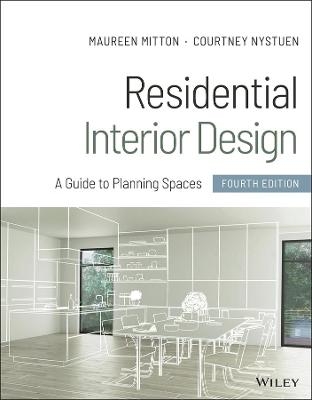
Residential Interior Design
John Wiley & Sons Inc (Verlag)
978-1-119-65342-4 (ISBN)
In the newly revised Fourth Edition of Residential Interior Design: A Guide to Planning Spaces, an accomplished team of design professionals delivers the gold standard in practical, human-centered residential interior design. Authors Maureen Mitton and Courtney Nystuen explore every critical component of interior architecture from the perspective of ergonomics and daily use.
The text functions as a guide for interior design students and early-career professionals seeking a handbook for the design of livable, functional, and beautiful spaces. It includes hundreds of drawings and photographs that illustrate key concepts in interior design, as well as room-by-room coverage of applicable building codes and sustainability standards. The authors also cover all-new applications of smart building technology and updated residential building codes and accessibility standards.
The book also includes:
A thorough introduction to the design of interior residential spaces, including discussions of accessibility, universal design, visibility, sustainability, ergonomics, and organizational flow
In-depth examinations of kitchens, bathrooms, and the fundamentals of residential building construction and structure
Comprehensive explorations of entrances and circulation spaces, including foyer and entry areas, vertical movement, and electrical and mechanical considerations
Practical discussions of bedrooms, leisure spaces, utility, and workspaces
An overview of human behavior and culture related to housing
Updates made to reflect changes in the 2021 International Residential Code (IRC)
The latest edition of Residential Interior Design: A Guide to Planning Spaces is ideal for instructors and students in interior design programs that include interior design, residential design, or residential interior architecture courses.
This edition provides updated content related to CIDA standards in human centered design, regulations and guidelines, global context, construction, environmental systems, and human wellbeing. It’s also an indispensable resource for anyone preparing for the NCIDQ, the interior design qualification exam.
Maureen Mitton is Professor Emeritus, and former Director of the School of Art and Design at the University of Wisconsin-Stout. She is on the review board of the Journal of Interior Design and is a Certified Interior Designer. Courtney Nystuen is an architect and educator who has taught architectural design at the University of Wisconsin-Stout for over thirty years. He is a member emeritus of the AIA.
Acknowledgments ix
Chapter 1 Introduction 1
What This Book Is About 1
An Overview: Quality and Quantity 1
Human Behavior, Culture, and Housing 2
Defining Housing-Related Terms 6
An Overview of Chapter Topics 6
Introduction to Accessibility Notes 7
Accessibility, Universal Design, Visitability, and Usability 7
Federal Accessibility Regulations Governing Housing 8
Introduction to Sustainability Notes 9
Defining and Understanding Sustainability 9
Green Building Codes, Rating Systems, and Certification Programs 10
Life-cycle assessment 11
Global Warming, Climate Change, Carbon, and the Built Environment 13
Ergonomics and Required Clearances 14
Organizational Flow 14
Related Codes and Constraints 14
More About the International Residential Code 16
Section R303 of the IRC covers light, ventilation, and heating 16
Section R304 of the IRC covers minimum room areas 16
Section R305 of the IRC covers ceiling height 16
Fire sprinklers and alarms are covered as follows 17
Electrical and Mechanical 17
Lighting 19
Types of Lighting 20
More Lighting Basics and Lighting Terminology 20
Smart Homes and the Internet of Things 25
References 26
Chapter 2 Basic Design Graphics and Sample Project 30
An Introduction to Orthographic Projections 30
Introductory Sample Project Design Drawings 33
Diagrams 33
Preliminary Orthographic Projection Drawings 33
Site Plans 34
Floor Plans 35
Exterior Elevations 39
Interior Elevations 39
Schedules 40
Additional Graphic Symbols 41
Final Sample Project Drawings 42
Dimensions 49
Sections 54
Reflected Ceiling Plans 54
Electrical and Lighting Plans/Power and Lighting Plans 55
References 55
Chapter 3 Entrances and Circulation Spaces 56
Introduction 56
Foyer and Entry Areas 56
Vertical Movement 58
Ergonomics and Required Clearances 61
More About Stairs 61
Organizational Flow 65
Related Codes and Constraints 69
Electrical and Mechanical 74
Lighting 74
References 78
Chapter 4 Social and Leisure Spaces 79
Introduction 79
Ergonomics and Required Clearances 83
Organizational Flow 87
Related Codes and Constraints 92
Electrical and Mechanical 93
Lighting 93
References 95
Chapter 5 Kitchens 97
Introduction 97
Getting Started 97
Organizational Flow 101
Fixtures and Appliances 104
Sinks 105
Faucets 110
Garbage Disposers 113
Dishwashers 113
Ranges 114
Cooktops 117
Wall Ovens 117
Microwave Ovens 118
Refrigerators 119
Ergonomics and Required Clearances 121
Work Counters and Cabinets 121
Dining Spaces for Interaction 123
Sinks 124
Dishwashers 126
Ranges and Cooktops 126
Ventilation 127
Ovens and Microwaves 128
Refrigerators 129
Kitchen Storage and Cabinetry 131
More on Cabinets and Built- In Storage 135
The Pantry 141
The Super Pantry and Butler’s Pantry 141
Related Codes and Constraints 142
Selected IRC Kitchen- Related Code Items 143
Electrical and Mechanical 143
Lighting 145
Prototype Kitchen Illustrations 149
References 159
Chapter 6 Bedrooms 161
Introduction 161
Ergonomics and Required Clearances 162
Organizational Flow 166
Related Codes and Constraints 169
Electrical and Mechanical 172
Lighting 174
References 180
Chapter 7 Bathrooms 181
Introduction 181
Fixtures 182
Toilets 182
Urinals 183
Bidets 184
Sinks 186
Faucets 188
Bathtubs 190
Showers 191
Showerheads and Fixtures 195
Smart Fixtures 198
Shut off Valves 198
Storage and Cabinetry 198
Sink Area 198
Toilet, Tub, Shower, and Linen Storage 201
Ergonomics and Required Clearances 201
Organizational Flow 209
Related Codes and Constraints 216
Electrical and Mechanical 216
Lighting 217
References 219
Chapter 8 Utility and Workspaces 220
Introduction: Types of Utility and Workspaces 220
Garages and Equipment Rooms 220
Laundry Spaces 220
Mudrooms 221
Hobby Spaces 222
Home Offices/Workspaces 222
Working and Learning from Home 224
Electronic Devices and Equipment 225
Managing Household Paperwork and Activities 225
Home Gyms and Exercise Equipment 225
The Flex Room 226
Laundry Appliances and Sinks 226
Clothes Washers and Dryers 226
Utility Sinks 228
Storage and Cabinetry 228
Garage Area Storage 228
Laundry Area Storage 228
Mudroom Area Storage 229
Bookshelves and Bookcases 229
Ergonomics and Required Clearances 229
Organizational Flow 230
Related Codes and Constraints 230
Electrical and Mechanical 232
Electric Vehicles 234
Lighting 238
References 239
Chapter 9 Basic Light Frame Residential Construction 240
Introduction 240
Standard Residential Building Platform Types 240
Basic Wood Frame Construction 240
Plumbing 240
Doors and Windows 240
Doors 240
Windows 245
Roof Types and Styles 248
Fireplaces and Stoves 250
References 255
Chapter 10 Notes on Remodeling 256
Introduction 256
Additions and Alterations 257
The Remodeling Process 259
The Assessment Phase 260
The Design Phase 261
Selection and Construction 262
Budgeting and Return on Investment 262
Organizational Flow, Ergonomics, and Required Clearances 264
Zoning and Building Codes 264
References 265
Appendix A ANSI, UFAS, and Fair Housing Bathrooms and Kitchens 267
Appendix B Sample Project Scenario/Problem Statement 271
Appendix C Common Construction Abbreviations 273
Appendix D Seated Wheelchair Dimensions 275
Appendix E Residential Elevator Information 277
Appendix F Common Stock Cabinet Configurations and Sizes 279
Appendix G Outdoor, Secondary, and Compact Kitchens 281
Index 285
| Erscheinungsdatum | 24.01.2022 |
|---|---|
| Verlagsort | New York |
| Sprache | englisch |
| Maße | 213 x 274 mm |
| Gewicht | 680 g |
| Themenwelt | Technik ► Architektur |
| ISBN-10 | 1-119-65342-8 / 1119653428 |
| ISBN-13 | 978-1-119-65342-4 / 9781119653424 |
| Zustand | Neuware |
| Informationen gemäß Produktsicherheitsverordnung (GPSR) | |
| Haben Sie eine Frage zum Produkt? |
aus dem Bereich


